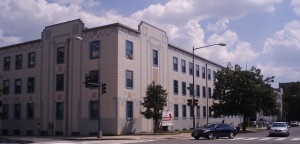What will happen to the District’s largest homeless shelter — CCNV — when federal restrictions on its use end over the next seven years? A Task Force consulted with residents over the site’s possible redevelopment and concluded that it should continue to serve homeless residents, though with a new mix of affordable housing and emergency shelter on site or nearby. DCFPI served on the Task Force and supports its “Statement of Principles,” which will be discussed today at a DC Council hearing. We hope that the work of the Task Force will serve as the foundation for a shelter feasibility study that the District will undertake over the next year.
The District owns the shelter building (officially called the Federal City Shelter) which hosts five nonprofits that offer a wide range of services to as many as 1,300 individuals at any given time. One of those nonprofits, the Community for Creative Non-Violence, owns the adjacent parking lot. Both were given by the federal government with the requirement that they be used to serve the homeless. The requirement on the CCNV lot expires in 2021. Given the coming expiration and the extensive repairs needed, the DC Council convened a Task Force to consider possible redevelopment options.
The Task Force held listening sessions with current residents and reviewed redevelopment projects in other jurisdictions. Given the large number of residents currently served, the Task Force stressed that the District should use the site to meet the needs of homeless residents, while recognizing that that it may not be feasible to serve the same number of people on site after the redevelopment.
- Affordable Housing: Residents overwhelmingly reported that their needs would be better met with housing, and this is backed by research showing that people who are homeless are better able to re-stabilize when placed quickly into housing. As a result, the Task Force recommends a mix of affordable housing, housing designed for the needs of youth under age 24, and permanent supportive housing (PSH). PSH combines affordable housing with intensive support services for individuals with significant behavioral and/or physical health problems.
- Emergency Shelter: Most residents agreed that the site should still provide shelter or that shelter should be provided nearby, and so the Task Force recommends the inclusion of year-round 24-hour low barrier shelter beds and hypothermia shelter beds. Low barrier shelters are shelters with few or no requirements for entry, ensuring they are easily accessible to homeless residents.
DCFPI believes that the “Statement of Principles” provide a solid foundation for the feasibility study that will assess the needs of residents and outline possible redevelopment options. DCFPI recommends that the study continue to incorporate residents into the decision-making process.
To see the entire testimony, click here.
To print a copy of today’s blog, click here.

